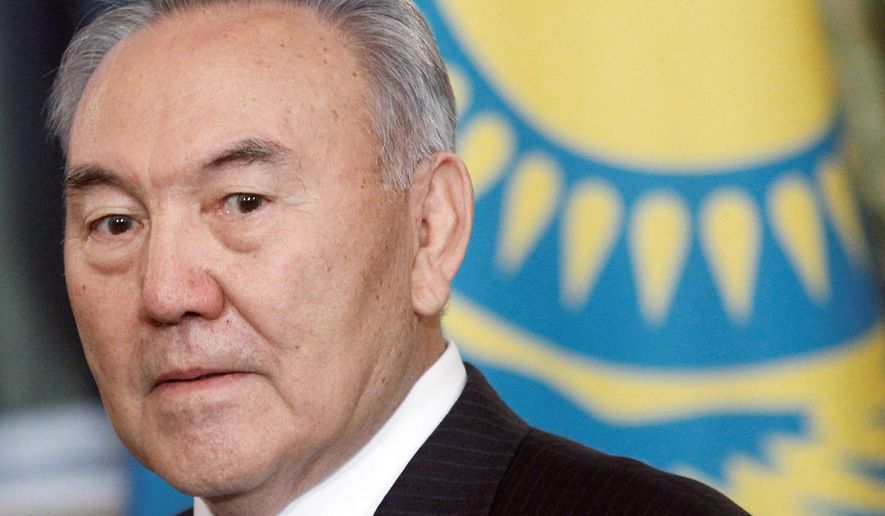Kazakhstan’s successful campaign for a seat on the U.N. Security Council is the latest in a string of ambitious diplomatic initiatives pushed by President Nursultan Nazarbayev to raise the former Soviet republic’s international profile — and provide a buffer against the advances of Russia to the north and China to the East.
The June 28 U.N. vote, in which Kazakhstan defeated Thailand after two rounds, makes Kazakhstan the first Central Asian nation to win a two-year term on the council and marks in a sense a lifetime achievement for the 76-year-old Mr. Nazarbayev, the onetime Communist Party boss who has been the only leader his country has known since it broke from the Soviet Union in 1991.
The president has been steering the nation of 18 million toward economic self-sufficiency and a secure sovereignty, in part because of its powerful neighbors. The Russian Federation, in particular, has been on the march to regain lost territory in recent years, as evidenced by its annexation of Ukraine’s Crimean Peninsula and its aggressive claims against Georgia.
“A dimension on Kazakhstan’s new role at the U.N., easily overlooked, is that it confirms Kazakhstan’s sovereignty and viability at a time when President Vladimir Putin is working opportunistically yet systematically to draw Kazakhstan and other members of his Eurasian Economic Union into Russia’s political orbit, as well as its economic sphere,” said S. Frederick Starr, chairman of the Central Asia-Caucasus Institute at Johns Hopkins University’s School of Advanced International Studies. “Kazakhstan’s new status directly confronts this project from Moscow.”
Kazakhstan’s U.N. win wasn’t universally welcomed. Human rights groups said Mr. Nazarbayev’s record on democracy and civil liberties has been spotty at best.
While saying the organization took no position on the Security Council bid, Human Rights Watch analysts Hugh Williamson and Mihra Rittmann wrote recently, “New Security Council member or not, it’s time for Kazakhstan to meet its longstanding international commitments and aim to genuinely make human rights one of the issues it can identify as making progress on.”
Mr. Starr said, “Like other countries in Central Asia under constant economic and geopolitical pressures, Kazakhstan has resorted to unapologetic authoritarianism. Nonetheless, it has a good record for stability.”
But analysts note that Kazakhstan, under Mr. Nazarbayev, also has conducted a consistent and successful campaign to raise its global profile. Just in the past two months, Kazakhstan has gained entry to the World Trade Organization, initiated the Asia-Europe Meeting, a working trade relationship with the European Union, and announced an ambitious trade rally, EXPO-2017, in its capital, Atana.
Kazakh diplomats traveled around the world campaigning for support before the Security Council vote.
“This extraordinary high frequency of international engagements is remarkable,” Johan Engvall and Svante Cornell, top Central Asia analysts at the School of Advanced International Studies, wrote recently.
The successes of Islamic fundamentalist groups such as the Islamic State have placed stress on Kazakhstan. Aktobe, a city of 400,000 near its border with Russia, was rocked June 5 by a series of shootings that the government blamed on religious hard-liners. The apparent terrorist attack, with civilian and military targets, was the worst in Kazakhstan’s history, killing seven people and 18 attackers.
In contrast to Russia and other Central Asian countries, Kazakhstan has rarely been attacked by Islamic radicals, even though an estimated 400 Kazakhs reportedly have joined the Islamic State in Syria. Aktobe was the site of the first suicide bombing in Kazakhstan’s history in 2011.
Kazakhs hope to use the country’s two-year Security Council term to put more attention on fighting counterterrorism around the world.
“For Kazakhstan, the seat allows it to promote its initiatives in nuclear nonproliferation, contribute in fighting terrorism and offer effective solutions to strengthen global energy, nuclear, water and food security,” said Shalkar Nurseitov, a Kazakh graduate student at George Washington University. “In addition, it’s an opportunity to demonstrate to the world that nations without significant political influence and nuclear weapons could contribute to keeping international peace when they are provided opportunities to do so.”




Please read our comment policy before commenting.